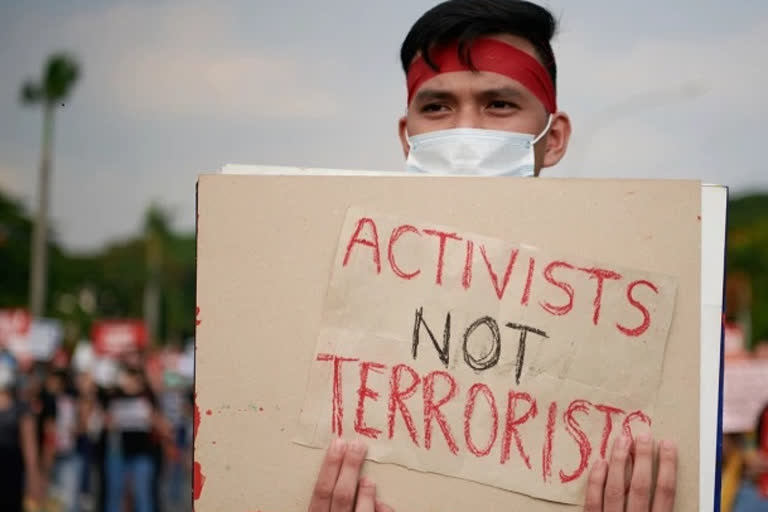Hyderabad: The purported misuse of the stringent Unlawful Activities (Prevention) Act 1967 by the State came under scrutiny by the Delhi High Court on Tuesday by granting bail to three student-activists Devangana Kalita, Natasha Narwal and Asif Iqbal Tanha, who were arrested on February 24 last year in north-east Delhi riots case.
The bench in its three separate judgements underlined the fact that UAPA cannot be applied in a "cavalier manner", and it is unbefitting to equate any dissent with "terrorist act". The court further went on to rubbish the charge sheet noting that there's nothing to show within section 15 (terrorist act), 17 (raising funds to commit a terrorist act), 18 (conspiracy to commit a terrorist act) of UAPA where the three accused can be framed.
What's UAPA?
The Unlawful Activities (Prevention) Act 1967 or simply the UAPA came into force as an anti-terrorism law to prevent unlawful activities and maintain the sovereignty and integrity of the country. However down the years, the law has been amended more than one occasion to incorporate the changing dynamics of terrorism.
Amendments to UAPA
The latest amendment in the UAPA, 2019 deals with the wide contours of terrorists-related to include individuals under Section 35 and 36 of Chapter VI of the Act. The act allows the DG of National Intelligence Agency seizure of property from proceeds of terrorism under Section 25. A review committee to denotify the individual notified as a terrorist is also constituted by the Union government thus diminishing chances of any institutional mechanism for judicial review.
Second, the new amendment is contrary to the principle of ‘innocent until proven guilty’ and also violates the International Covenant on Civil and Political Rights, 1967, which recognizes the mentioned principle as a universal human right.
Third, the UAPA is being used to repress rather than counter terrorism since the amendment provides that designation of an individual as a terrorist would not lead to any conviction or penalties.
Finally, the government has been provided with “unfettered powers” to declare an individual as a terrorist.
UAPA’s Constitutionality?
In Sajal Awasthi vs Union of India and Association for Protection of Civil Rights vs Union of India – with Sajal Awasthi being the lead petition filed a Public Interest Litigation (PIL) against UAPA, 2019 in the Supreme Court to declare it unconstitutional as it violates basic fundamental rights. According to Awasthi, the UAPA indirectly curtailed the right to dissent which was against Articles 14 (right to equality), 19 (right to freedom of speech and expression) and 21 (right to life) of the Indian Constitution.
On similar lines, the Association for Protection of Civil Rights (APCR) filed another petition where it contended that the new Section 35 gives a free hand to the Centre to designate an individual as a 'terrorist', which is antithesis to Article 14.
Also in another case, Amnesty International took up the misuse of UAPA against Kashmiri journalist Masrat Zahra, wherein he was booked under Section 13 for 'uploading anti-national posts' on Facebook with criminal intentions.
Problematic Legislation
Since the UAPA allows the government to arrest citizens arbitrarily, legal experts view it as problematic legislation for following reasons:
* UAPA hardly allows dissent
* Those arrested under UAPA can be incarcerated up to 180 days without a charge sheet being filed
* The Act confers upon the government with sweeping discretionary powers and also authorizes the creation of "special courts with the ability to use secret witnesses and to hold closed-door hearings"
* The Act becomes a tool in the hands of the government to use against the opposition in the name of 'security'.



